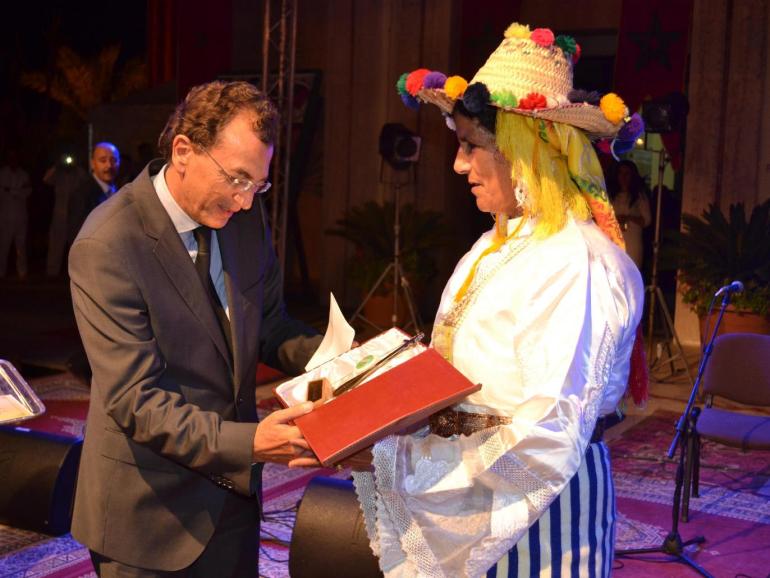The Moroccan artist, Shama Al-Zaz, died yesterday, Monday, after a long illness at the age of 70, who is considered the icon of the mountain song "Taqtuqa", or mountain folk art (associated with the Jabala region).
The deceased was a widow at the age of 17, after a marriage that only lasted 4 years, and since then she devoted her life to caring for her two children and singing in a conservative area dominated by a culture of shame and forbidden.
Shama Al-Zaz was known for her performance in the mountain art of "Al-Ayyou", and she spent the most prominent part of her artistic career accompanying the late Dean of the Mountain Taqtuqa, Muhammad Al-Arousi.
A mole singing for her two children
Shama composed the lyrics of more than 50 songs, and her words, whether she composed and composed her or the ones she sang, expressed her suffering as a woman and a widow responsible for two sons, in which she told about her patience and her effort to provide them with a decent life.
She sang to her two children in one of her songs, saying, "My children, and time is hot, your door is dead, and the sisters of Ali Al-Dar."
That is, "My children, time is harsh, your father died and the house is empty."
Artist Shama Al-Zaz organized the lyrics of more than 50 songs (Al-Jazeera)
North Star
Al-Jazeera published a report about the late actress last year, while receiving treatment in a Moroccan hospital, where she was being treated for blockage of heart valves.
It is noteworthy that the late artist Shama Al-Zaz, who was fond of mountain farming, defied customs and traditions, so her family was deluded that she was going to work in agriculture.
However, she sang at weddings and events under the pseudonym "The North Star" until the hidden was revealed.
“It was a difficult period,” Shamma said to Al-Jazeera Net, digging deep into her memory, as her family did not accept the situation and pressured her to stop singing, so that her uncle interrupted her for 14 years;
However, the pressures did not discourage her from pursuing her passion.
With her distinctive traditional dress consisting of a colorful chashia (a dom hat decorated with colored wool threads), a sabaniyeh (the name of the headdress in the northern cities) and a fatta (a striped dress that women put on the lower part of their bodies), according to the custom of northern women, she sang a mama at festivals and parties inside and outside Morocco, The voice of the mountain woman moved, cheering the audience, and the stage shook under the strength of her captivating mountain voice.
Al-Zaz with the former Minister of Culture during her honor as an icon of Al-Ayyou and Al-Aita Mountain in Morocco (Al-Jazeera)
Aida rhythm and speech
We consider Shama Al-Zaz as one of the few mountain women who stormed the world of Al-Aita, which was monopolized by men, and challenged what is said to be a "defect" in the region. This is how researcher in mountain heritage Abdel Wahid Al-Dhahabi talks about the reality of Al-Aita's artists.
Al-Dhahabi added that Shama followed the path of other women who laid the first building blocks during the 1950s, such as Manana Al-Sarifiyyah, Rahimou Al-Wazzani, Al-Saadia Al-Sarifiyyah, and Khadija Al-Khamsiah.
Al-Dhahabi describes the voice of Shama Al-Zaz, who collaborated with the pioneers of Aita and the mountain song, as "tender, pure and free of impurities," as it is, according to him, "the icon of the eyes that gave her beautiful voice the mountain arts flavor."
Al-Aita is an essential component of the mountain musical and lyrical heritage, along with the rest of the components: mountain song, Ayyu, ready-made musical forms, Chinese dance, stitching, and blowing, which are integral components that researchers in this heritage seek to record and record as a national and global heritage.
Al-Dhahabi refuses to call the "Al-Taqtuqa Al-Jabaliya" that some call this musical genre. The Taqtuqa - according to him - refers to simple and easy songs, while the mountainous Aita is one of the most difficult arts of rhythm and speech.
The rhythm - as he says - is a maddah (of praise), and speech is a poetic body consisting of two halves of poetic verses that carry strong linguistic implications.
Therefore, it cannot be described as a simple rhyme, especially since the people of Jabala themselves cannot perform it perfectly unless they accompany its elders and discipline them at their hands.
Manifestations and improvisation
The mountainous Aita begins with an introduction in which they invoke God Almighty as saying, "In the name of God we have and the Prophet prayed us," and is interested in showing the beauty of the mountainous terrain and enriching the nature of the region and its peculiarities. It also tells about the jihad and battles during the Moroccan resistance to the Portuguese, Spanish and French invaders.
The authentic mountainous aita has neither spinning nor dancing, according to Abdul Wahid Al-Dhahabi
Rather, it expresses mystical manifestations and serious issues. On the other hand, the mountain song opens with its light melody on all issues, such as spinning, nature, separation, love, anger, praise and slander.
The mountain song is known as the dialogues that take place between a singer and a singer on social issues and human concerns, and among the most famous of the discussions was the one between the pioneer and renewer of the mountain song, the late Muhammad al-Arousi and Shama al-Zaz.
As for Al-Ayyou ', it is an improvised feminist singing art that was performed by women during harvesting, logging and harvesting olives, then it was transferred to the festivals stage by the late Muhammad al-Arousi and Shama al-Zaz, as they used to open the song by improvising poetic syllables that express what is going on in their minds and what psychological states they encounter.

